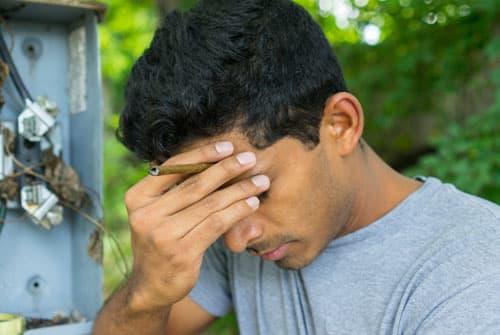Title: The Green Dilemma: Unraveling the Myths of Marijuana Overdose
As the world embraces the changing perceptions of marijuana, legalizing its use for recreational and medicinal purposes, a lingering question remains at the forefront of discussions: Can you overdose on marijuana? The plant, revered for its ability to relieve pain, alleviate anxiety, and enhance pleasure, carries with it a complex narrative that blends science, folklore, and individual experience. While the euphoric highs of cannabis capture the imagination, the potential risks often remain shrouded in uncertainty. In this article, we will navigate the intricate landscape of marijuana consumption, exploring the boundaries of its effects, the implications of excessive use, and the facts behind the myths surrounding overdose. Join us as we demystify the green conundrum and untangle the threads of safety, dosage, and personal responsibility in the age of cannabis.
Table of Contents
- Understanding Marijuana Overdose: Myths and Realities
- Recognizing the Signs: Symptoms of Marijuana Overconsumption
- Navigating Dosage: Safe Consumption Guidelines for Cannabis Users
- Seeking Help: When to Consult a Professional After Overindulgence
- Q&A
- To Conclude
Understanding Marijuana Overdose: Myths and Realities
When discussing the possibility of overdose, it’s essential to separate fact from fiction. Many people believe that consuming large amounts of marijuana can lead to death or severe health crises, similar to substances like alcohol or opioids. In reality, marijuana has a remarkably high therapeutic index, meaning that the dose needed to cause significant harm is far greater than what any user typically consumes. Common myths include the idea that someone can “overdose” and die from marijuana alone; however, there have been virtually no documented cases of fatal marijuana overdose. Instead, adverse effects, while uncomfortable, usually involve heightened anxiety, paranoia, or impaired judgment. These symptoms are temporary and can often be alleviated through supportive measures and time.
Understanding the potential risks helps users navigate their consumption responsibly. The following points outline the realities surrounding marijuana use and overdose concerns:
- Comfortable Dosage: Most users experience a bell curve of effects; too much can lead to discomfort, not danger.
- Medical Supervision: For those using marijuana medicinally, healthcare providers can offer guidance on safe dosing to avoid unpleasant effects.
- Individual Variability: Factors like body weight, tolerance, and method of intake (edibles vs. smoking) can influence experiences significantly.
Recognizing the Signs: Symptoms of Marijuana Overconsumption
While marijuana is often viewed as a safe recreational substance, overconsumption can lead to uncomfortable and even distressing symptoms. Users may experience a range of manifestations that indicate they have consumed too much. Some common symptoms of marijuana overconsumption include:
- Severe Anxiety or Paranoia: Users may feel an overwhelming sense of fear or panic.
- Rapid Heart Rate: A noticeable increase in heart rate is a common physical response.
- Nausea and Vomiting: Those who have overindulged in marijuana may find themselves feeling sick.
- Lethargy: An overwhelming sense of tiredness can overtake the user.
- Disorientation: A feeling of confusion or being “out of it” may set in.
In some cases, the symptoms might escalate to more serious complications. Recognizing these signs early can help users manage their experience effectively. Below is a quick reference table that outlines some critical effects associated with excessive marijuana use:
| Symptom | Severity Level |
|---|---|
| Severe Anxiety | High |
| Increased Heart Rate | Moderate |
| Nausea | Moderate |
| Lethargy | Low |
| Disorientation | High |
Navigating Dosage: Safe Consumption Guidelines for Cannabis Users
Understanding the nuances of cannabis dosage is essential for any user looking to enjoy its benefits responsibly. Start low and go slow is a guiding mantra among experienced consumers. This approach encourages users to begin with lower doses, usually measured in milligrams of THC or CBD, and gradually increase as needed. Keeping a dosage journal may help track effects and personal preferences, allowing users to find their optimal levels without overconsumption. It’s also important to consider the method of consumption, as edibles can have delayed effects compared to smoking or vaping, leading to unintentional overconsumption.
When exploring safe consumption guidelines, being aware of individual tolerance levels is crucial. Factors such as body weight, metabolism, and even previous experiences with cannabis can dramatically influence how one should dose. To facilitate thoughtful dosing, consider the following tips:
- Know your product: Research strains and their THC/CBD content.
- Start with microdoses: For beginner users, 2.5-5 mg of THC is a good starting point.
- Wait it out: After consuming, wait at least 1-2 hours to gauge the effects.
- Stay hydrated: Keep water on hand to mitigate dry mouth and enhance comfort.
| Form of Consumption | Suggested Starting Dose | Onset Time |
|---|---|---|
| Smoking/Vaping | 2.5-5 mg THC | Immediate to 10 mins |
| Edibles | 2.5-5 mg THC | 30 mins to 2 hrs |
| Tinctures | 2.5-5 mg THC | 15-45 mins |
Seeking Help: When to Consult a Professional After Overindulgence
Recognizing when to seek professional assistance after excessive consumption of marijuana is crucial for ensuring your safety and well-being. Overindulgence can lead to a range of uncomfortable symptoms that may initially feel overwhelming. Some signs that it’s time to consult a healthcare provider include:
- Severe anxiety or paranoia: Intense feelings that disrupt daily life.
- Persistent vomiting: Inability to keep food or fluids down.
- Confusion or disorientation: Difficulty in distinguishing reality.
- Rapid heart rate: Experiencing irregular or high heartbeats.
If any of these symptoms extend beyond a few hours or escalate in severity, it is imperative to seek guidance from a professional. Healthcare providers can offer various treatments or interventions to alleviate symptoms. Particularly in emergency situations, hospitals are equipped with the resources to closely monitor vital signs and provide supportive care. Understanding the risks of excessive use and recognizing when intervention is necessary can help users navigate their experiences more safely and responsibly.
Q&A
Q&A: Can You Overdose on Marijuana?
Q1: Is it possible to overdose on marijuana?
A1: The short answer is that while it’s highly unlikely to experience a fatal overdose from marijuana, consuming excessive amounts can lead to distressing symptoms. Unlike some substances, marijuana has a wide safety margin, but that doesn’t mean more is always better.
Q2: What does an overdose on marijuana look like?
A2: Overdosing on marijuana typically manifests as acute discomfort rather than a life-threatening situation. Symptoms can include paranoia, anxiety, rapid heart rate, dizziness, nausea, and extreme fatigue. It’s more about your state of mind than a physiological crisis.
Q3: How much marijuana would it take to overdose?
A3: There’s no standard dose that determines an overdose, as it varies by individual. Factors such as a person’s tolerance, body weight, and the potency of the product play significant roles. That said, reports suggest that consuming large quantities of high-THC products can lead to unpleasant experiences rather than a classic overdose.
Q4: Are all forms of marijuana equally risky in terms of overdose?
A4: Not necessarily. Edibles, for instance, can be particularly potent and have delayed onset effects. Users may consume more than intended while waiting to feel the effects, leading to a higher chance of overconsumption. Inhaling marijuana, however, usually allows for better control over the dosage.
Q5: What should someone do if they think they’ve overdosed on marijuana?
A5: If someone is feeling overwhelmed after excessive marijuana consumption, it’s best to sit in a comfortable and safe space, drink water, and practice deep breathing. Most symptoms will pass, but if they feel that their condition is worsening, seeking medical attention is always a sensible choice.
Q6: Can marijuana overdose be fatal like other substances?
A6: To date, there are no confirmed cases of a fatal marijuana overdose. The body’s receptors process THC without leading to life-threatening consequences. Importantly, combining marijuana with other substances, especially alcohol, can heighten risks, so it’s crucial to use caution with poly-drug use.
Q7: What are the long-term effects of frequent high-dosage marijuana use?
A7: Regular high doses could lead to issues like cannabis use disorder, impaired cognitive function, and memory problems. Moderation is key, not only to avoid unpleasant experiences but to maintain overall well-being.
Q8: Can you build a tolerance to marijuana?
A8: Yes, frequent use of marijuana can lead to increased tolerance over time. This means that users may require larger amounts to achieve the same effects. It’s wise to be mindful of this phenomenon and consider taking breaks to reset your tolerance levels.
Q9: What’s the best approach to using marijuana safely?
A9: Start with a low dose, especially if you’re inexperienced or trying a new product. Pay attention to how your body reacts and give it time to feel the effects before consuming more. Being in a comfortable environment and with trusted individuals can also help create a safer experience.
Q10: how should one perceive the risks of marijuana overdose?
A10: While the notion of overdosing on marijuana might create concern, it’s essential to approach it with a balanced perspective. Like any substance, understanding one’s limits and exercising caution are key. Enjoying marijuana mindfully can mitigate risks, allowing for a positive experience while minimizing discomfort.
To Conclude
while the idea of overdosing on marijuana may evoke strong imagery, the reality is nuanced and complex. Current research suggests that, although extremely high doses can lead to uncomfortable and distressing experiences, they rarely reach the catastrophic levels associated with overdose on other substances. Understanding the effects of marijuana, including how individual tolerance, consumption methods, and the potency of products all play critical roles, is essential for responsible use. As legislation evolves and research progresses, our grasp of cannabis’s implications on health will continue to deepen. Until then, informed choices, mindfulness, and awareness are your best allies in navigating the world of marijuana safely. Whether you’re a seasoned user or just beginning to explore this plant, remember: moderation and education are keys to a balanced experience.



